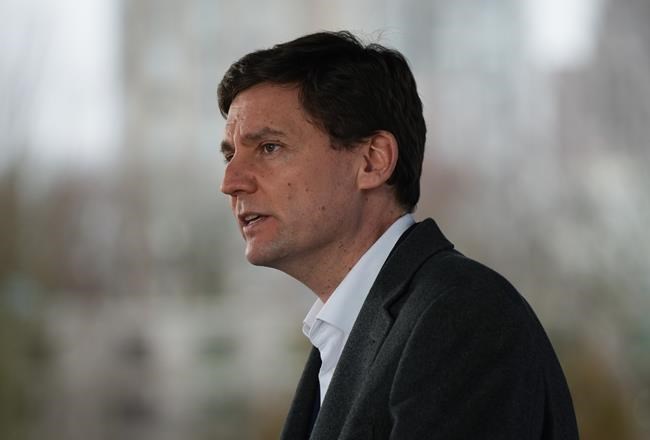VICTORIA — The failure of a massive, multi-year money laundering investigation to yield charges is a "shocking" example of the shortfalls of federal financial crime law, British Columbia Premier David Eby said Thursday.
Eby called for tougher laws a day after B.C.'s prosecution service announced no charges will be laid in the E-Nationalize investigation into millions of dollars that moved through B.C. casinos and Chinese bank accounts.
"Obviously, there's a serious problem with federal criminal law that allows this conduct to continue in our province," he said.
"It's probably shocking to British Columbians that you can have somebody in our province accepting suitcases full of bundled bills, operating in an unlicensed, illegal so-called money service business, receiving the money clandestinely, and that after teams of prosecutors have reviewed that conduct that there is no criminal charge that they can find that they can proceed with," said Eby.
Special prosecutor Chris Considine issued what is known as a "clear statement" Wednesday in which he advised against charges in the E-Nationalize investigation and suggested federal law amendments to better support financial crime cases.
The investigation concluded in 2021 with police proposing eight charges against Paul King Jin of Richmond, B.C.
Considine, a senior Victoria lawyer, was appointed last March to conduct a second review of the case, after an earlier decision by the prosecution service that charge assessment standards had not been met and no charges would be approved.
He suggested the federal government amend the Proceeds of Crime (Money Laundering) and Terrorist Financing Act to explicitly criminalize the operation of unlicensed money service businesses that were used in B.C. to accept, deliver and transfer funds locally and overseas.
"Such an amendment would bring Canadian law into harmony with the approach in both the United Kingdom and the United States," says the clear statement. "Alternatively, the Criminal Code itself could be amended to specify that funds transmitted through a money services business that has not complied with the registration requirements (are), by definition, derived from the commission of an indictable offence."
B.C. Attorney General Niki Sharma said she will lobby the federal government to amend Canada's financial crime law following the failure of the investigation to produce any charges.
"We'll be issuing a letter to the federal government to make those changes, to request those changes," she said.
A spokeswoman for the federal finance department, which administers the proceeds of crime act, said Canada takes a comprehensive and co-ordinated approach to combating money laundering, terrorist financing and organized crime.
Adrienne Vaupshas, the minister's press secretary, said the federal government has made significant investments to strengthen Canada’s anti-money laundering and anti-terrorist financing regime.
"But we recognize there is more to do to support effective prevention, enforcement and prosecution of financial crimes," Vaupshas said in an email.
She said in recent months the government has expanded its programs to cover payment service providers and crowdfunding platforms.
Eby, a former B.C. attorney general who often raised the money laundering issue while a member of the New Democrat opposition, said the federal government has made some changes to help fight money laundering, but "there's obviously more to do."
B.C. is preparing to introduce legislation to combat money laundering, including the use of unexplained wealth orders, in which people with suspected connections to organized crime must demonstrate how they acquired their assets or face their seizure by the province, he said.
The NDP government is also planning to expand civil forfeiture laws, in large part because of the E-Nationalize case and other investigations, said Eby.
Considine's statement refers to the "somewhat similar" E-Pirate investigation by the federal Serious Organized Crime Unit of the RCMP. The probe that began in 2015 culminated in charges of money laundering being laid by the Public Prosecution Service of Canada, but Considine notes these were eventually stayed in November 2018.
Peter German, a former RCMP deputy commissioner and author of two reports investigating money laundering at B.C. casinos, said in a statement both levels of government will likely be considering Considine's suggestions about law changes.
"It is disappointing to learn that a second large money laundering investigation which stems from the issues B.C. faced in its casinos has resulted in no charges," he said in an emailed statement.
"B.C. has had great difficulty maintaining charges under our proceeds of crime legislation," said German. "Law makers in Ottawa and enforcement and prosecution authorities at both levels of government will no doubt be considering the special prosecutor’s comments and what can be done to strengthen our legislation, investigative capacity, and prosecution response."
Considine's clear statement, which refers to Jin as "Mr. X," says the proposed charges included laundering currency and bank drafts, possession of property obtained by the commission of an indictable offence, and failure to register a money services business.
It says E-Nationalize, launched in 2016 by the Joint Illegal Gaming Investigations Team, identified 10 transactions between February and May 2017 in which about $20 million in bulk cash, bank drafts and casino chips were received and moved to clients, and more than $7 million was deposited in bank accounts in China.
Jin, who did not testify, was represented by lawyers at the Cullen Commission public inquiry into money laundering in B.C. that concluded billions in illicit funds linked to organized crime and the drug trade had an effect on B.C.'s real estate, gaming and luxury vehicle sectors, but found no corruption by officials.
Former premier John Horgan appointed retired judge Austin Cullen in May 2019 to lead the inquiry.
This report by The Canadian Press was first published March 2, 2023.
Dirk Meissner, The Canadian Press




